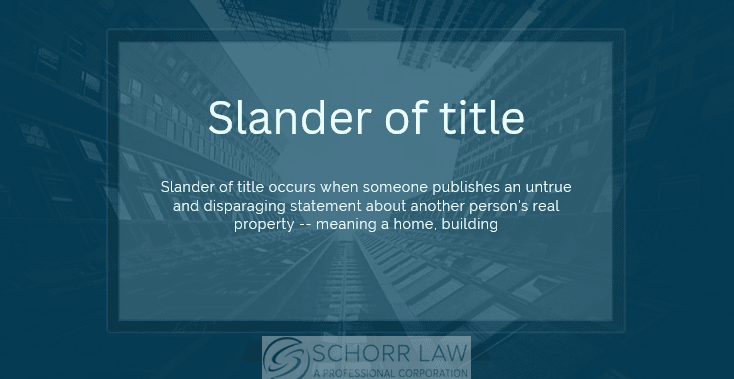

Updated on November 1, 2022
Most people are familiar with a defamation lawsuit, which are brought to protect a person’s reputation and ability to monetize on his or her reputation and name. Fewer people know that there is a comparable type of lawsuit that one can bring to protect a person’s interest in the ability to sell his or her personal or real property. It is called a slander of title.
We have previously discussed slander of title in a prior blog post, focusing on the ability of a party to bring a slander of title claim based on the recording of a lis pendens. This post provides an introduction of what a slander of title is and the requirements of bring suit under this claim.

A slander of property provides the marketability of his or her own property. It is often used, for example, in cases where Person A claims a lien on Person B’s property without a right to the lien and records a lis pendens.
Person B can then bring a slander of title action, alleging that Person A has no right to a lien or interest in the property and that Person A’s recording of a lis pendens disparages Person B’s title to the property.
To maintain this type of lawsuit, Person B would need to plead the following elements:
● Person A said or wrote a false statement disparaging Person B’s title to real or personal property, which could mean that Person A did something that casts doubts about Person B’s ownership of the property;
● Person A made the statement to a third person (which may include recording a lis pendens or deed in the public record);
● Person A made this statement with express or implied malice, i.e., Person A knew the statement was false or recklessly made the statement without knowing whether or not the statement was true;
● Person A lacked a privilege to make the statement; and
● Person B suffered financial harm as a direct and natural consequence of Person A’s false statement.
If Person B prevails, the court may award damages the compensate Person B for the financial harm suffered as a result of the slander of title, the costs of bringing the suit, compensation for the time and inconvenience in clearing the title, among other damages.
Person A may disagree that he is liable for slander of title and insist that the lien on the property is valid and defend the validity of lis pendens. There are several defenses that may absolve Person A of liability:
● Proving that the alleged “false statement” was in fact true – this is an obvious one, but if Person A proves in court that the statements regarding Person A’s interest in the property were in fact true, then the slander of title action will fail.
● Showing Person A had an absolute or qualified privilege to make the statement. See California Code of Civil Procedure, section 47 for applicable statutory privileges. For example, Person A may argue he had a right to record a lis pendens against Person B’s property in connection with another litigation. See Cal. Code Civ. Proc. § 47(b)(4). Thus, for Person B to maintain his slander of title suit against Person A on the grounds that Person A recorded a lis pendens, Person B will be required to show that the other litigation did not involve a real property claim or the alleged claim in the other case lacks merit. Note, this issue is complicated by California Anti-Slapp Statute.
● Person A may also argue that the statute of limitations for the slander of title to real property has expired because it has been over three years since Person B had a reasonable opportunity to discover the cause of action.
Please keep in mind that these examples are simply used to illustrate some types of defenses that may be applicable in a Slander of Title action. This blog post is not meant to be a full and complete discussion of Slander of Title because any analysis is always case dependent and must consider the application of California Anti-Slapp statute and the litigation privilege.
Schorr Law represents and advises commercial and residential clients on a wide range of real estate issues, including title disputes. To see if you qualify for a free consult, please call (310) 954-1877 or email us at [email protected].
See related: Slander of Title Based on a Recorded Lis Pendens